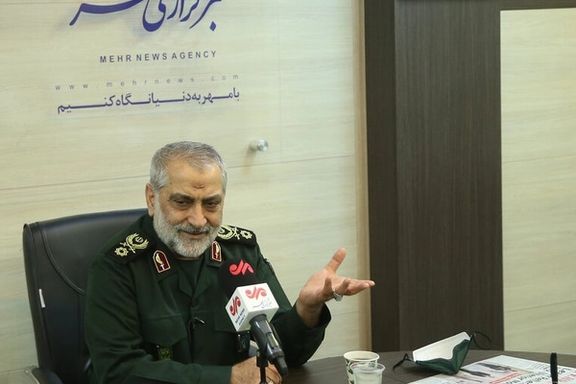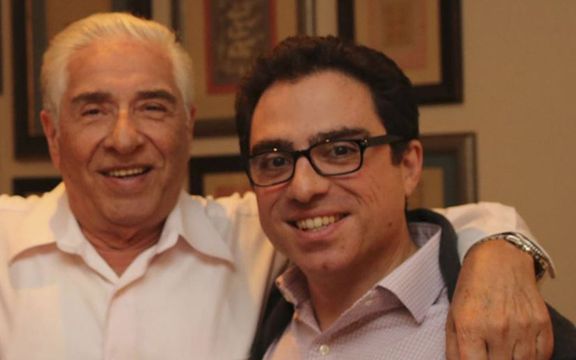Guards General Vows 'Harshest Response' For Israel's 'Smallest Mistake'

A senior Iranian military official has urged regional countries to strengthen their relations with the Islamic Republic instead of Israel.

A senior Iranian military official has urged regional countries to strengthen their relations with the Islamic Republic instead of Israel.
Spokesman for Iran’s Armed Forces Brigadier General Abolfazl Shekarchi told Mehr news agency on Tuesday that the smallest strategic mistake by Israel “will be met with our harshest response” without directly referring to the recent Israeli threats against the Islamic Republic.
He commented on Israel’s regional alliances without mentioning normalization of ties with the United Arab Emirates and Bahrain, saying, “We do not consider the Zionist regime to have capability to cause insecurity for the Islamic Republic.”
"We advise the countries of the region that in fact they should look at the powerful country of Iran as a very strong and independent neighbor and strengthen their relations with the Islamic Republic to preserve their dignity," Shekarchi said, adding that “The Zionist regime is hated by all nations no matter their religion.”
Israel’s Defense Minister Benny Gantz warned on Sunday that even if a nuclear deal is signed, Iran must be stopped from becoming a nuclear threshold state.
Moreover, Israeli Foreign Minister Yair Lapid urged the United States on Monday not to remove Iran’s Revolutionary Guard (IRGC) from its list of terrorist groups, as nuclear talks in Vienna near a conclusion.
Lapid said, “The terrible nuclear deal is about to be signed in Vienna. Iran is seeking to cancel the Revolution Guard’s listing as a terrorist organization. If they’re not a terror group, then what are they? A folk dancing troupe?”

Reuters news agency reported Tuesday that sources “close to the negotiations” in nuclear talks claim a prisoner exchange between Iran and the US was looming.
Reuters last week reported that a “draft text of the agreement” to revive the 2015 nuclear deal, the JCPOA (Joint Comprehensive Plan of Action)m between Iran and world powers would begin with Iran restricting uranium enrichment to 5 percent, “the release of Western prisoners held in Iran,” and Washington lifting a threat to sanction South Korean banks over repatriating $7 billion Iranian assets.
The agency Tuesday cited a “senior Iranian official in Tehran” that "Iran has always and repeatedly expressed its readiness” to swap prisoners.
“Months ago we were ready to do it but the Americans ruined the deal," the official reportedly said. "Now I believe some of them will be released, maybe five or six of them. But those talks about prisoners are not linked to the nuclear agreement, rather associated with it. This is a humanitarian measure by Iran."
On Saturday, Iranian Foreign Minister Hossein Amir-Abdollahian said the Islamic Republic was ready for an immediate prisoner exchange. Tehran would like to see the release of Iranians jailed in the US, mostly over sanctions violations, including businessman Sajjad Shahidian. In 2018 foreign minister Mohammad Javad Zarif, himself sanctioned by the US the following year, said Iranians were held in the US as “hostages.”
US special envoy Robert Malley has appeared to suggest it unlikely that Washington would return to the JCPOA, which it left in 2018, unless Tehran freed four American prisoners, including father and son Baquer and Siamak Namazi.
"Six years ago the Iranian government arrested Baquer Namazi and they still refuse to let him leave the country," Malley tweeted on Tuesday. "The Iranian government can and must release the Namazis, Emad Shargi, Morad Tahbaz, and other unjustly held U.S. and foreign nationals."
State Department issued a statement Tuesdaysaying that Baquer Namazi had been arrested six years earlier to the day “solely for the purpose of using him as a political pawn” and that both father and son had been “sentenced to ten years in prison on baseless charges.”
Key issues to be fixed
Britain has been seeking the release of British-Iranians Anousheh Ashouri, jailed on espionage charges, and Nazanin Zaghari-Ratcliffe, a project manager with the Thomson Reuters Foundation, under house detention in Tehran.
Both Enrique Mora, chairing the Vienna talks, and Mikhael Ulyanov, Russia’s lead negotiator in Vienna, tweeted Tuesday that the negotiations were near to conclusion. Mora, however, noted that “key issues need to be fixed.”
Reuters cited “several Iranian officials” who said that while “some minor technical issues were being discussed in Vienna” and while “nothing is agreed until everything is agreed," they expected a deal “before the end of the week.”
Speaking to a conference of gas-exporting countries in Doha Tuesday, Iranian President Ebrahim Raisi said that the world should refused “cruel” US sanctions, which would no longer be effective “in today's world.”

Iran's parliament has approved the general outline of a bill to enforce restrictions on the internet and access to various apps and platforms in the country.
The bill, ironically titled Legislation to Protect Cyberspace Users’ Rights, was passed by the so-called Joint Siyanat Committee on Tuesday.
Instead of voting in a general session, the bill was sent for final approval to the committee, as has been the case with many recent controversial legislations.
Many internet users and some media outlets in Iran have said that the implementation of this plan has practically started in in recent weeks as the authorities reduced bandwidth and slowed broadband as a means of censorship.
Reza Taghipour, former communications minister and a Tehran representative, who heads the committee on cyberspace, said on Tuesday that foreign companies should abide by the new Iranian law to remain active in the country.
The new law would require foreign and domestic social-media networks and messaging applications to register with a regulatory and supervisory board, including representatives of the intelligence ministry and the intelligence organization of the Revolutionary Guards.
The ministry of communications and information technology would be charged with blocking social networks and messaging applications that failed to gain approval.
Iran has restricted access to the internet for two decades and popular social media platforms such as Facebook and You Tube for the past ten years. An overwhelming majority of Iranians routinely use circumvention software to go around government blockages.

Iran’s Supreme Leader has ordered the parliament and the government not to overburden banks by unreasonable demands, since it would lead to printing more money.
In January, the minister of economy ordered all government-owned banks to pay up to $4,000 in small loans to salaried people without a guarantor or collateral. The decision came as four years of high double-digit inflation has impoverished the middle class and the new government, having had made lofty promises last year, felt obliged to make a gesture.
On Monday, Speaker of Parliament Mohammad Bagher Ghalibaf informed lawmakers that he received a letter from Khamenei asking the legislature and the presidential administration not to demand payments by banks that are beyond their financial resources to fulfill.
Ghalibaf said that when the government or parliament make decisions asking banks to undertake additional obligations, it simply forces the financial institutions to turn to the Central Bank of Iran (CBI), which in turn must print more money. This leads to even more inflation, which has already been hovering around 40 percent since 2021.
The Speaker pointed at CBI chief’s remarks on Sunday that the banks and the central bank are not able to finance new programs without pushing inflation higher.
Banks in Iran are kept afloat by the CBI and in most cases are heavily indebted, while the government also has a 50-percent budget deficit.
Just in the past six months, liquidity jumped by $14 billion, CBI announced earlier this month. Last October, the CBI reported that liquidity had increased eightfold since 2013. In those 8 years, Iran was either under international sanctions or United States sanctions for a total of 5 years, losing hundreds of billions of dollars in oil and other revenues. The CBI during this time had to print money to pay the government’s bills.
President Ebrahim Raisi pledged upon assuming office last year that his government would not overburden banks by borrowing. However, it later issued bonds that are mostly sold to government-owned banks, which must turn to the central bank for money. In a vicious circle of borrowing from itself, the government simply prints more money – a practice that is not unique to the current administration.
Ghalibaf warned that the country cannot produce more oil – let alone export – and the current budget is already based on exporting 1.4 million barrels per day. The presidential administration wants even more money and that would demand daily crude production of 4 million barrels, which is an impossibility, he said.
Iran has failed to sufficiently invest money and technology in its oil and gas infrastructure in the past decades. Oil minister Javad Owji said last November that the country needs $160 billion to upgrade its oil and gas production.
But some economists in Iran ask why the financial situation has not improved despite higher oil sales in the past one year. Reports indicate that Iran has been exporting much higher volumes of crude to China, totaling more than $20 billion in 2021.
One explanation can be that China is not fully paying cash for its purchases. Another possibility is that Iran is replenishing its currency reserves depleted during sanctions instead of spending the money. A third possibility is that the additional sales have already financed close to $50 billion in imports in the past one year, without the government being forced to touch the remainder of its currency reserves.
The lifting of US sanctions in case of a nuclear agreement will not drastically change this picture, except raising oil revenues closer to $40 billion a year, which would ease the pain but not finance an economic reconstruction.

Iran's foreign ministry Tuesday urged all parties to the Ukraine crisis to avoid escalation while accusing NATO and the United States of being “provocative.”
Etemad Online, website of reformist Etemad newspaper, quickly portrayed Saeed Khatibzadeh words as "Iran's siding with Russia."
"The Islamic Republic of Iran invites all sides to have restraint and believes that any action that caused escalation of tension should be avoided," Saeed Khatibzadeh said in a statement on the foreign ministry website. He said that NATO, under US leadership, had worsened the situation in by "meddling and provocative actions,” a likely reference to NATO refusing to rule out Ukrainian membership.
Reza Ghobeishawi, of the editorial board of conservative Asr-e Iran newspaper, tweeted Tuesday that the state broadcaster (IRIB) was biased. "IRIB's two o'clock news report on the Ukrainian crisis was fully supportive of Russia,” he wrote. “It censored the Russian troops' arrival into Ukraine.”
While social media had been awash with opinions and theories, most media in Iran stuck to reporting news with little analysis. Interest has warmed up since Russian President Vladimir Putin's decree recognizing two breakaway regions in eastern Ukraine.
Sacrificial meat
In tweets, supporters of Mahmoud Ahmadinejad have repeated his allegations in late January of a US-Russian “dirty deal” to invade Iran and Ukraine. The former president said he had “accurate knowledge” that the US would “allow Russia to invade Ukraine…[and] the US to move onto Iran.”
Amir Tafreshi, a founding member of the Justice-Seeking Student Movement, an Islamic student union, tweeted that Iran should condemnNATO for provocation and Russia for not respecting Ukraine's territorial integrity. "Any delay in the announcement of this policy will strengthen the suspicions that Russia dominates Iran's foreign policy,” he opined.
Iran's state broadcaster in its reports has highlighted that Yemen's Houthis, Cuba, Syria, and Venezuela have supported Russia's position. Among Iran's neighbors and allies, so far Turkey has condemned Putin's recognition of the breakaway Ukrainian regions.
Etemad-e Melli newspaper published a commentary by political analyst Ahmad Zeidabadi saying that a Russian invasion of Ukraine would not affect the nuclear talks between Iran and world powers in Vienna, even if it had “a destructive effect on circumstances” once agreement was reached in Vienna on reviving the 2015 nuclear deal.
Afifeh Abedi, researcher at the Center for Strategic Research, an arm of the Expediency Discernment Council, tweeted that Ukraine was “the living and perfect example of the sacrificial meat that Russia and the West have divided between themselves … It's Iranian statesmen's duty to only seek maximal securing of Iran's own national interests … as the sensitive stage of Vienna talks coincides with the developments in Ukraine…”

Iran has blamed NATO for the recent escalation in the Ukraine crisis, calling for restraint from both sides, as Russia has moved to dismember the country.
Foreign Ministry spokesman Saeed Khatibzadeh said on Tuesday that provocative measures and interventions by the United States led to drastic escalation of tensions.
"Unfortunately, NATO's provocative measures and interventions, led by the US, have further complicated the situation in the region”, he said.
The Islamic Republic is monitoring the developments with sensitivity and urges all sides of the conflict to exercise restraint and avoid any actions that could aggravate the tensions, Khatibzadeh said.
President Vladimir Putin announced late Monday that Russia recognized the independence of two breakaway regions of Donetsk and Lugansk in eastern Ukraine held by separatists, practically paving the way for the deployment of Russian troops.
Hours after Putin’s move, Ukrainian President Volodymyr Zelenskyy said his countrymen “are not afraid” announcing that it would deploy troops there to “maintain peace”.
The decision by Moscow has triggered international condemnation and a promise of targeted sanctions and a promise of targeted by the United States and the European Union.
An urgent meeting of the United Nations Security Council (UNSC) was held on the deepening crisis as the United States said the announcement by Putin was an “unprovoked violation of Ukraine’s sovereignty and territorial integrity”.